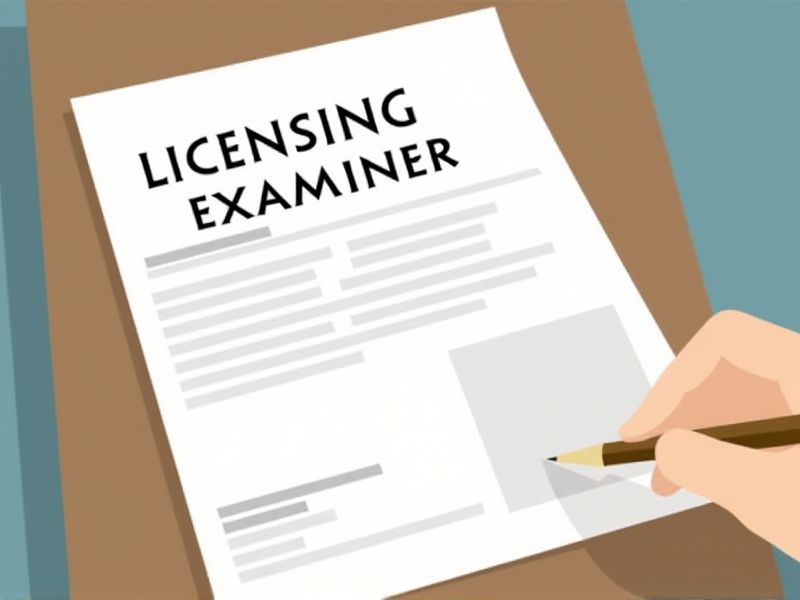
Licensing Examiners play a crucial role in assessing and validating compliance with industry standards and regulations, requiring a strong foundation of knowledge and skills. Certifications ensure that examiners are well-versed in specific legal and procedural requirements, enhancing their decision-making capabilities. By standardizing expertise, certifications help maintain consistency and fairness in licensing processes. Some key certifications may be essential for a career as a Licensing Examiner.
Certified Licensing Professional (CLP)
Certified Licensing Professional (CLP) credentials validate an examiner's expertise in the complex field of licensing, fostering trust among stakeholders. A CLP has proven proficiency through rigorous examination, ensuring they possess up-to-date knowledge of industry standards. As the licensing sector faces evolving legal and technological challenges, certified professionals are better equipped to navigate these changes. Organizations benefit from having CLPs, as they can enhance negotiation prowess and optimize asset management.
Certified Regulatory Compliance Manager (CRCM)
Licensing examiners face complex regulatory landscapes, and a Certified Regulatory Compliance Manager (CRCM) provides expertise in navigating these intricacies. A CRCM ensures adherence to ever-evolving laws, reducing risk of non-compliance fines and legal challenges. Their specialized knowledge in regulatory frameworks supports effective policy implementation and enforcement. With a CRCM, organizations experience improved trust and credibility among stakeholders, enhancing overall business stability.
Certified Government Financial Manager (CGFM)
The CGFM designation demonstrates expertise in government financial management, which directly enhances a Licensing Examiner's ability to assess financial compliance. Possessing a CGFM equips examiners with a deeper understanding of federal, state, and local government operations, crucial for making informed licensing decisions. The certification also ensures examiners remain current with best practices and evolving regulations in the government sector. With this knowledge, Licensing Examiners can more effectively identify financial discrepancies or issues in the licensing process.
Certified Fraud Examiner (CFE)
A Certified Fraud Examiner is necessary for a Licensing Examiner role as their expertise in identifying fraudulent patterns enhances the integrity of the licensing process. Their skillset allows them to effectively evaluate documentation and detect anomalies, ensuring only qualified applicants receive licenses. With a solid understanding of financial transactions and compliance standards, CFEs contribute to minimizing fraud-related losses. The presence of a CFE in the licensing examination process promotes public trust and safeguards institutional reputations.
Project Management Professional (PMP)
Project Management Professional (PMP) certification equips a licensing examiner with robust project management frameworks, which can enhance the efficiency and organization of licensing processes. The structured approach learned through PMP aids in tracking complex tasks and deadlines, ensuring thorough and timely licensing evaluation. Familiarity with risk management principles from PMP helps preempt and address potential issues that may arise during the licensing assessment. Holding a PMP certification elevates a licensing examiner's professional credibility, potentially increasing stakeholder trust and confidence in their assessments.
Certified Public Manager (CPM)
A Certified Public Manager (CPM) brings enhanced leadership and management skills to the role of Licensing Examiner, improving process efficiency. CPM training ensures a standardized understanding of public administration, which contributes to uniform decision-making. It aids in developing strategic problem-solving capabilities, crucial for addressing complex regulatory challenges. Continuous professional development through CPM can lead to higher public trust and improved service quality in licensing processes.
Certified Administrative Professional (CAP)
Gaining the Certified Administrative Professional (CAP) designation equips Licensing Examiners with validated administrative skills, enhancing their ability to handle tasks efficiently. As a result of this enhanced capability, examiners can better manage data, documentation, and communications, integral to licensing processes. The CAP certification ensures adherence to standardized practices, which can increase trust in the examiner's competency and reduce errors. Because of these benefits, organizations often prefer or require CAP-certified individuals, fostering higher levels of credibility and professionalism in licensing roles.
Certified Municipal Planner (CMP)
When cities plan to expand infrastructure, a Certified Municipal Planner (CMP) ensures responsible growth by offering expertise in zoning laws and land use regulations. In the context of licensing examinations, their detailed understanding helps evaluate projects for compliance with municipal policies. Employing a CMP in the licensing process minimizes the risk of legal challenges as they guide decisions according to current urban planning standards. Municipal governments can enhance efficiency and sustainability in development projects with a CMP's involvement in licensing examinations.
Lean Six Sigma Green Belt (LSSGB)
Lean Six Sigma Green Belt (LSSGB) is needed for a Licensing Examiner to streamline processes, minimizing inefficiencies that often arise in licensing procedures. Knowledge in LSSGB equips the examiner with analytical tools for data-driven decisions, improving the accuracy and speed of licensing determinations. Training in LSSGB enhances problem-solving capabilities, reducing errors in documentation and enhancing compliance with regulations. This certification fosters a culture of continuous improvement, ensuring that licensing operations progress efficiently and effectively.
Certified Quality Auditor (CQA)
A Certified Quality Auditor (CQA) ensures that systems and processes meet established standards, which enhances accountability in licensing examinations. Due to complex regulatory requirements, CQAs bring expertise in identifying inconsistencies and fostering compliance. They play a critical role in improving the credibility and accuracy of examination results through proficient auditing techniques. By implementing systematic evaluations, CQAs contribute to maintaining fairness and legitimacy in licensing processes.
Summary
When you achieve certification as a Licensing Examiner, your credibility and trust within the industry will likely increase. It's expected that this enhancement in qualifications will lead to more effective decision-making and reduced errors in assessments. You may also find an improvement in professional development and career growth opportunities. Over time, your adherence to industry standards and best practices can positively impact overall regulatory compliance and public safety.
